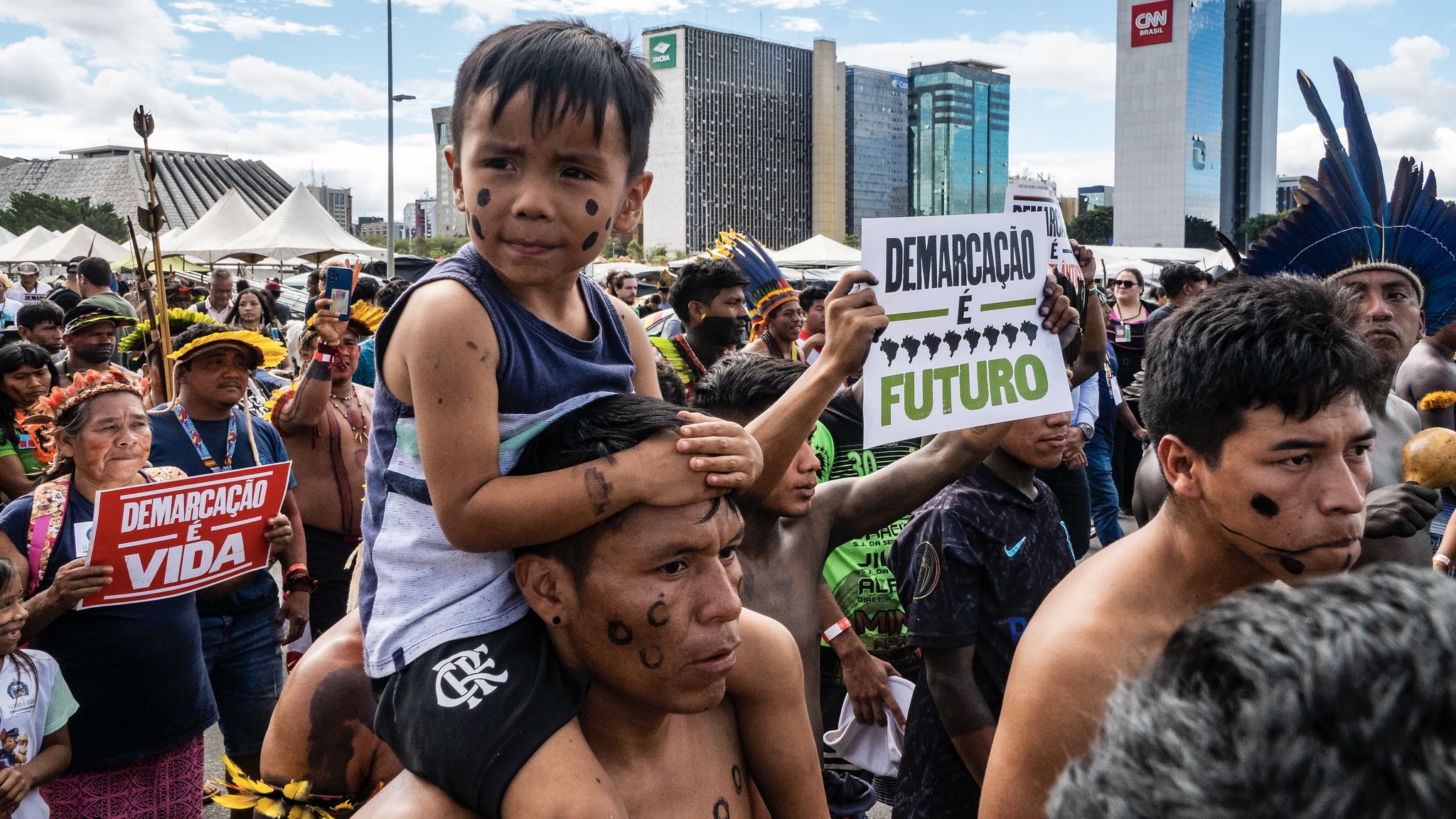Indigenous people from all over the country are convening in Brasília to demand the Federal Supreme Court (STF) overturn the Time Limit framework, which should be seen by the court on Wednesday June 7. Around two thousand Indigenous people will be camped in the Citizenship Square, near the National Theater, to follow the ruling.
The mobilization camp takes place in the context of Environment Day, celebrated on June 5, and one year since the murder of the Indigenous activist Bruno Pereira and the journalist Dom Phillips in the Javari Valley, the second largest Indigenous area in Brazil.
The legislation in question, seeks to radically change the criteria for demarcating Indigenous land, a designation which not only protects the rights of Indigenous people but also necessarily puts restrictions on extractive activities amongst other conservation measures. The bill proposed by the right-wing large landowning congressional caucus, establishes that only the lands already occupied by Indigenous peoples on October 5, 1988 – when the Constitution was passed – can be claimed by them. It is considered unconstitutional by broad sections of jurists and lawyers.
“We are mobilized here again this week against all these setbacks in rights that are being discussed in Congress. Last week was a sad week for us,” said Val Eloy Terena, one of the executive coordinators of Articulation of the Indigenous Peoples of Brazil (APIB), during a press conference held on Monday June 5, the first day of the camp. In addition to Brasília, mobilizations are expected to take place in other regions of the country.
According to APIB, the camp’s program was divided into three topics, namely: for demarcation now; for the future of the planet; and for the “original” right over the land.
Kleber Karipuna of the Coordination of the Indigenous Organizations of the Brazilian Amazon (COIAB) recalled the importance of the Federal Senate and the STF to stop what he classified as anti-Indigenous measures. “We will continue to mobilize, because it is our right. We have the right to have our territories demarcated,” said Kleber, who is also a member of the coordination of APIB.
Cacique Raoni said during the press conference that he was in Europe (where he was received by the president of France, Emanuel Macron), but that he returned to Brazil to participate in the camp. “I came back to talk to the parliamentarians and the president of the Supreme [Federal Court] so that PL 490 is not approved,” said the cacique in Indigenous language, which was translated simultaneously.
The session on the Time Limit framework is scheduled to be discussed in the Federal Supreme Court (STF). The president of the court, Minister Rosa Weber, announced that the ruling on Extraordinary Appeal (RE) 1017365 will resume on June 7, wherein they will discuss whether the date of the promulgation of the Federal Constitution should be adopted as a time limit for defining the traditional occupation of land by Indigenous people.
PL 490 is now 2903
On May 30th, the Federal Chamber of Deputies approved Bill 490/07, known as the Time Limit Bill. The text provides for the application of the time limit framework in the demarcation of Indigenous lands. The vote was 283 to 155. Only deputies from the Workers’ Party (PT), the Socialism and Liberty Party (PSOL), the Communist Party of Brazil (PCdoB) and Rede voted against the project. The approval means that new lands can only be demarcated if they were occupied by Indigenous peoples on the date of the promulgation of the 1988 Constitution.
The bill is now moving on to the Federal Senate and has been given a new number: 2903.
The Indigenous Missionary Council (CIMI) says that 60% of the 1.4 thousand Brazilian Indigenous lands are not regularized. In almost 600 cases, the demarcation process has not even started. If it becomes law, the time limit framework will be the main argument of farmers and large companies to question the demarcations not yet concluded.
“If the framework is approved, we will have a paralyzing of the demarcations and we will certainly have requests for reviews of lands already demarcated,” said Paloma Gomes, legal advisor of CIMI, in a previous interview with Brasil de Fato.
Mobilizations in São Paulo
This past weekend, hundreds of Guarani Indigenous people from Terra Jaraguá mobilized against the bill near the Bandeirantes highway in São Paulo. The original location of the protest was changed after a decision by the São Paulo Court of Justice (TJ-SP), on Saturday June 3, which prohibited the act on the highway.
Following the publication of the decision, Indigenous entities classified the decision as “unconstitutional” and affirmed that the act would take place.
“Demonstrating is a constitutional right and we will continue demonstrating. If they don’t let us do it in one space, we will do it in another. But we will not stop demonstrating,” affirmed Antony Karaí Poty, from the Indigenous Terra Jaraguá, to Brasil de Fato, on Saturday 3.
“It is a totally unconstitutional decision. Once again we see that the Brazilian State acts with all its strength against the Indigenous peoples and against the right to demonstrate. We will take the necessary steps as an Indigenous movement,” Kleber Karipuna said regarding the restrictions on the right to protest.
The time limit framework is inserted in Bill 490, which was approved by the House of Representatives last Tuesday May 30 and now awaits a vote in the Senate. However, the ruling of the Supreme Court, which is set to take place on June 7, should override any decision in the National Congress.
“Indigenous people have the right to be against the time limit framework and to engage in peaceful and orderly demonstrations, ensuring the right to come and go of all Brazilian citizens in closing the highway, with lanes released for the passage of vehicles, without hurting anyone’s right to come and go, but ensuring the right to demonstrate,” said the coordinator of APIB.
This article is based on reports from Brasil de Fato.





